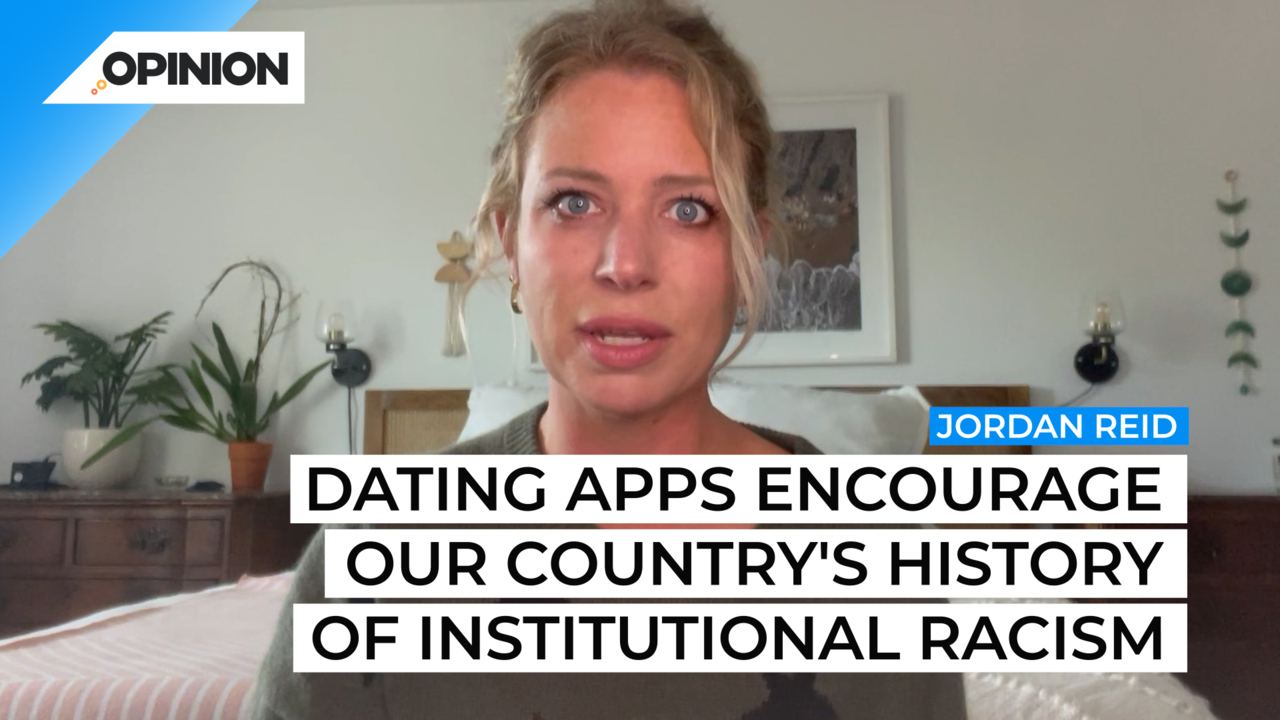
Commentary
-
Our commentary partners will help you reach your own conclusions on complex topics.
I’ve been divorced for about four years, which means that I am way more familiar with the dating app landscape than I ever hoped to be in my forties. And it’s…really something.
Forget about the age liars – it’s a thing – catfishers, and truly astounding numbers of men wearing fedoras…one of the most striking things to me right off the bat was how quickly and directly dating apps ask you to confront your so-called “preferences.”
Do you want a non-drinker? Someone who dabbles in hallucinogenics? A farmer – and only a farmer? There’s an app for that. But even the most seemingly egalitarian apps often ask you right off the bat what gender, age, religion, and – yes – race you prefer. Which can be a jarring question to be asked to answer outright, whether it’s something you’ve ever consciously given thought to or not.
On Hinge, for example, you can mark your preferred race or races, and then indicate whether race is a “dealbreaker” or not. And that’s just…okay, according to a lot of apps, and a lot of users.
Because – of course – the mechanics underlying dating apps, like so many other societal institutions – are deeply rooted in institutionalized racism.
According to Celeste Curington, co-author of The Dating Divide, race is a huge component of online dater’s choices almost across the board – a fact that is in itself differently acknowledged along racial divides.
If you tell people of color that studies show that online dating benefits white people the most and Black people the least, with other races tending to fall somewhere in between, they’ll probably be less-than-shocked, while white users – especially ones who identify as progressive – may resist confronting their conscious or unconscious preferences and biases.
In 2020, a number of dating apps – including Grindr – removed so-called “ethnicity filters” in the wake of the Black Lives Matter protests following the murder of George Floyd. But the filters only go so far – even in their absence, users can of course swipe right or left based on whatever they want.
Those who hold that incorporating racial preferences into online dating is a valid choice tend to equate them to, say, a preference for a certain type of cuisine – ignoring the obvious fact that the rejection of an entire group of humans based on their racial or ethnic makeup isn’t exactly the same as not being super into jalapenos.
What it comes down to is that dating apps, on their surface, have the potential to subvert social structures, including racial profiling, but when they incorporate features that allow you to literally see only people who are similar to you, that disruptive effect evaporates.
The solution here isn’t necessarily clear cut: Spokespeople for companies that utilize the filters hold that they are useful for minority users looking to find other users with similar ethnic backgrounds. Further, not all preferences are problematic – a white woman saying she only wants to date men with blonde hair and blue eyes is different than a Black woman saying that she prefers dating Black men because she wants to avoid the prevalence of racism and fetishization of Black women that’s so often found on these sites.
But institutions – including dating apps – should not present users with the ability to virtually surround themselves solely with individuals of a given race, and then double down on the effect with algorithms that reflect these biases. When you look at it that way – just how deliberate and systemic the selection system is, and the degree to which it permits and even encourages our country’s longstanding history of institutional racism – the issue isn’t really all that complicated after all.
-
RFK Jr.’s war on psychiatric meds risks decades of progress
On Feb. 18, during his first meeting with staff, Health and Human Services Secretary Robert F. Kennedy Jr. stated that he intends to address the possible overmedication of children and the risks of antidepressants — echoing a Trump executive order aimed at reducing childhood chronic disease rates. The order has sparked concerns over youth access… -
Loss of USAID makes America and the world less safe
Elon Musk and President Trump shocked the U.S. foreign policy community and America’s partners around the world with the early and abrupt closure of USAID, the United States Agency for International Development. USAID was a cornerstone of U.S. foreign policy and consistently received bipartisan support from Congress. Experts warned that the decision puts millions of… -
Trump’s ‘Gulf of America’ renaming is mere political spectacle
Aboard Air Force One, en route to the Super Bowl in New Orleans, President Trump held a news conference. As the flight entered international waters over the Gulf of Mexico, he issued an executive order renaming it the “Gulf of America” and declaring Feb. 9 as “Gulf of America Day.” The order, titled Restoring Names… -
President Trump politicizes DC plane crash as Americans mourn
Sixty-seven people died when a Black Hawk helicopter crashed into American Airlines Flight 5342 as it came in for a landing at Reagan National Airport on the night of Jan. 29 outside of Washington, D.C. Investigators are still examining the accident and putting details together, but believe that the helicopter was flying at too high… -
Project 2025 is Trumpism on steroids
President Trump has already taken several actions that align with Project 2025, a far-right blueprint for Trump’s second term developed by the Heritage Foundation. Among other intiatives, his administration has moved to eliminate DEI programs, reinstate service members dismissed for refusing the COVID-19 vaccine, and revive “Schedule F,” a policy making it easier to fire…
Latest Opinions
-
 Getty Images
Getty Images
Trump admin. asks federal workers to detail weekly accomplishments, again
-
 Getty Images
Getty Images
Military members with gender dysphoria to be processed for separation: DOD
-
 Getty Images
Getty Images
Zelenskyy says Trump not owed an apology after White House dustup
-
 Getty Images
Getty Images
NCAA Tournament: Which men’s teams are on ‘bubble watch’?
-
 Getty Images
Getty Images
NFL scouting combine: How much faster can these players run?
Popular Opinions
-
In addition to the facts, we believe it’s vital to hear perspectives from all sides of the political spectrum.






